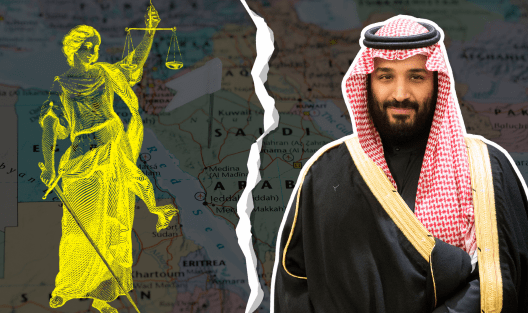
Ten ways that Saudi Arabia violates human rights
Saudi Arabia makes headlines hosting glittering events, securing famous footballers including Cristiano Ronaldo to play in its national league, and for innventive ideas such as the notorious ‘The Line’ city concept.
But the reality for people living in Saudi Arabia, is one where their basic human rights are ignored, their freedoms are restricted and punishment is severe.
For example, blogger Raif Badawi was sentenced to 1,000 lashes and 10 years in prison for ‘insulting Islam’ and founding an online forum for political debate. He was due to be flogged 50 times every week. In 2022, Raif was finally released, but he faces a travel ban, meaning that after not seeing his family for 12 years, he will have to wait another 9 years.
Raif’s case is just the tip of the iceberg for the Gulf Kingdom’s appalling human rights record.
Here are 10 ways Saudi Arabia is violating its citizens’ human rights:
- Executions are on the increase
Saudi Arabia executed 196 people in 2022. On 12th March, the authorities killed 81 men in one day – the single largest mass execution in recent decades. The country ranks as the 2nd highest for use of the death penalty.
Find out more about the the use of the Death Penalty in 2022
- Women are widely discriminated against
Women and girls remain subject to discrimination in law and in practice. The male guardianship system was enshrined into law in 2022, and means that women must have a male legal guardian – and they cannot choose who this is.
Also, many women, such as Loujain, who supported a campaign against a ban on women drivers were imprisoned and harassed, despite the fact that the law was then changed to allow women to drive.
- Unfair trials and torture during detention
In 2022, Saudi Arabian authorities arbitrarily detained Ethiopian men, women and children for up to 18 months in inhumane conditions and tortured and otherwise ill-treated them before forcibly returning them to Ethiopia. They were held in overcrowded cells with inadequate access to food, water, sanitation and healthcare in two detention centres prior to their deportation. At least 12 men died.
Trials against people are often grossly unfair and courts impose long prison sentences. People are often held in solitary confinement without any communication. Salma al-Shehab, a student of Leeds University and mother of two was sentenced to 27 years in prison on terrorism-related offences after a a grossly unfair trial for publishing tweets in support of women’s rights.
- Migrant workers treated poorly
According to the Interior Ministry, there is a consistent crackdown on foreign nationals, with 479,000 being returned to their home country out of 678,000 arrested. During that same period, 14,511 foreign nationals, most of them Ethiopians and Yemenis, where violence has forced many to flee, were arrested for crossing the border irregularly from Yemen into Saudi Arabia.
- Crackdown on free media & press
The Saudi authorities control domestic media and journalists can be imprisoned for a variety of ‘crimes’.
Saudi authorities including the Crown Prince sanctioned the brutal murder the journalist Jamal Khashoggi after he had been critical of the government. Leadership in the country has never been held to account for their role.
- No free speech
Besides Raif Badawi, dozens more outspoken activists remain behind bars, simply for exercising their rights to freedom of expression, association and assembly.
Many of Saudi Arabia’s prominent and independent human rights defenders have been imprisoned, threatened into silence, or fled the country.
- No LBGTQI+ rights
LGBTQI+ rights are not legally recognized or protected in Saudi Arabia, even being labeled as ‘extremist ideas’. The country’s legal system prohibits LGBTQI+ relationships, public displays of affection and gender expression, with severe societal stigma, discrimination, and legal repercussions for LGBTQI+ individuals, including imprisonment, fines, or death penalty.
- Travel bans
Many human rights activists who have been released from unfair imprisonment, face continued punishment. Many are given travel bans, meaning they are unable to leave the country & see loved ones.
- Forced evictions
Over half a million people in the city of Jeddah have been forcibly evicted and their homes demolished, to make way for luxury hotels and buildings.
A compensation scheme, announced after the demolitions, excludes foreign nationals, who make up nearly half of those impacted.
- No protests
Protests and demonstrations are illegal. Those who defy the ban face arrest, prosecution and imprisonment on charges such as ‘inciting people against the authorities’.
So, the next time you see a headline about Saudi Arabia hosting the men’s World Cup, taking over a UK football club or releasing outlandish ideas for our cities, keep in mind how the country’s authorities treat its own people.
Saudi Arabia isn’t the only country that is repressing the right to protest, even in the UK, the government is cracking down this fundamental right.






